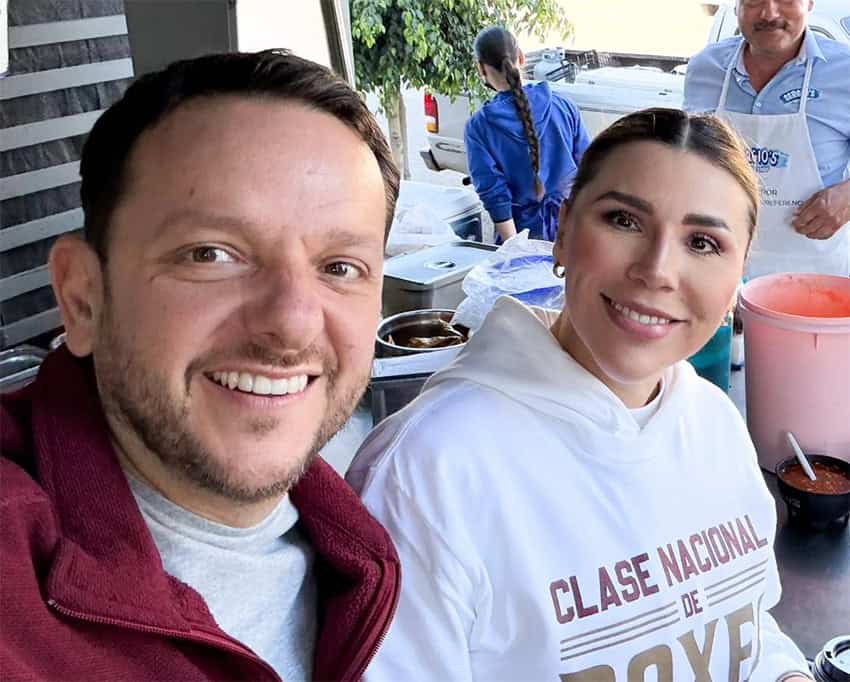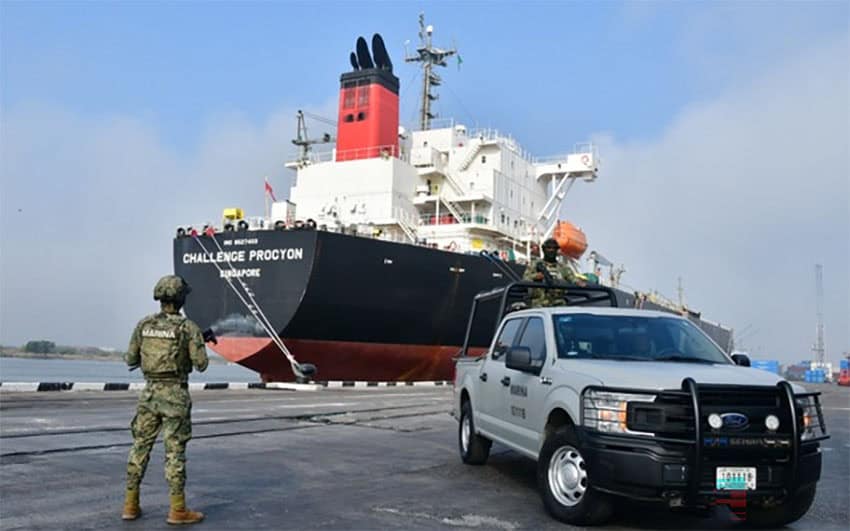The Trump administration has begun revoking U.S. visas for Mexican politicians it believes are linked to the drug trade, including high-profile members of President Claudia Sheinbaum’s ruling Morena party, according to a new ProPublica investigation.
The list of targets includes Mexican state governors and allies of former President Andrés Manuel López Obrador, signaling a sharp escalation in bilateral tensions.
Last weekend, Baja California Governor Marina del Pilar Ávila revealed her visa was canceled in recent weeks, as was the visa of her husband, Carlos Torres Torres, a member of Mexico’s lower house of Congress, the Chamber of Deputies, from 2006 to 2009.
According to longtime journalist Adela Navarro, editor-in-chief of Tijuana’s Zeta Weekly, the governor is “collateral damage” in a U.S. probe targeting her husband and her brother-in-law, Luis Alfonso Torres.
Navarro said in an interview on Radio Fórmula the two brothers are under investigation for their potential involvement in a case of stolen fuel that reportedly entered Mexico illegally from Texas.
“What we were told [by unnamed sources inside] the State Department was that she would be collateral damage. In the United States, they often do this by disabling the inner circle of the person of interest,” the journalist said. “The ones they are investigating are Carlos Torres and his brother.”

The question that persists in Mexico, “particularly among the overwhelming Morena wing,” Navarro wrote in a piece for Zeta Weekly, “is whether President Sheinbaum will save the reputation of [Governor Ávila] by interceding with the U.S. government to have her B1/B2 tourist visa reactivated.”
Torres’ visa was revoked at the Tijuana border crossing about three weeks ago, according to Zeta Weekly, with the governor notified later “via consular service” that hers was being revoked, too.
The ProPublica report, published Thursday, said the “Trump administration has begun to impose travel restrictions and other sanctions on prominent Mexican politicians whom it believes are linked to drug corruption,” information the report attributed to U.S. officials.
The report added: “U.S. officials said they expect more Mexicans to be targeted as the administration works through a list of several dozen political figures who have been identified by law enforcement and intelligence agencies as having ties to the drug trade.”
All of this coincides with a report released Thursday by the U.S. Drug Enforcement Administration (DEA) in which an entity codenamed Operation Top Fuel (Liquid Death) links Mexican cartels to a multibillion-dollar fuel theft ring.
The 2025 National Drug Threat Assessment notes that criminal organizations like the Jalisco New Generation Cartel and the Sinaloa Cartel smuggle stolen Pemex fuel to finance narcotics operations.

“This black-market petroleum smuggling operation is the primary means by which the Transnational Criminal Organization (TCO) finances its networks,” the DEA wrote.
According to ProPublica, the operation that snagged Ávila and Torres revives a 2019 DEA list of “several dozen” Mexican officials compiled after López Obrador began shutting down Mexico’s cooperation with the U.S. in counterdrug programs.
Seeking to “identify Mexican government figures who could be criminally prosecuted for aiding drug traffickers,” the earlier effort led to the 2019 indictment and 2024 conviction of ex-Security Chief Genaro García Luna.
As for Ávila, opposition lawmakers such as National Action Party (PAN) Deputy Federico Döring have urged her to “step down” and “use that time to clarify what she needs to clarify with U.S. authorities.”
“Why? What argument do you have?” Sheinbaum countered.
Ávila denied having foreign bank accounts — “they don’t exist,” she said — but remained silent on her husband’s finances. The U.S. Embassy declined to comment, citing visa privacy rules.
The White House initiative invokes Section 212 of the Immigration and Nationality Act, allowing visa bans for suspected drug collaborators. ProPublica reported Treasury sanctions freezing U.S. assets could follow.
The operation is being overseen by White House Deputy Chief of Staff for Policy Stephen Miller and Deputy Homeland Security Adviser Anthony Salisbury, noted ProPublica.
Former Mexican Ambassador Arturo Sarukhaan warned in the ProPublica report that the crackdown risks inflaming tensions.
“It gives [Sheinbaum] — a nationalistic president with a very chauvinistic party behind her — a perfect excuse to say that everything bad that’s happening in Mexico … is because of U.S. imperialism,” he said.
With reports from Proceso, El Sol de México, LatinUS, Radio Fórmula and Zeta Tijuana

It doesn’t yet appear that the Governor has any personal guilt. So, why treat her worse than El Chapo’s family?
I reject this incredulous statement from the corrupt, incompetent, pathologically deceitful Trump regime:
‘“This black-market petroleum smuggling operation is the primary means by which the Transnational Criminal Organization (TCO) finances its networks,” the DEA wrote.’ This gives the impression that Robin Hood steals gasoline to give away drugs for the good of society. It reeks of a diagnosis.
Mexico needs to do its part regarding government involvement in Cartel activity just as the US needs to address illegal arms shipments and address addiction. I am still hopeful that close US/Mexican cooperation can address this decades old problem that has only grown more serious over time. It really requires global cooperation because it is a global problem.
Yes! Clean your own house before demeaning your neighbor’s
One of my first thoughts was, ‘Do they really need to finance their drug trade?”
All these corrupt politicians are from the PAN party. The US administration was not happy!
The U.S. is a bunch of hypocrites. When will it cut ties to its own cartels of lobbyists, gangs, and wealthy elites? The convicted felon, adjudicated rapist receives a baksheesh of a jumbo jet and redirects the national news to a flashy new petroleum scam to fund a drug ring. And the point man being Stephen Miller guarantees that the operation spews confusion and malice where ever it turns.
Yes, Stephen Miller says it all!
The discussions around AMLO’s dealings with the cartels are well known. Morena is complicit in the actions of the cartels. Sheinbaum is in the cartels pocket too as evidenced by her demanding of the release of Ismael “El Mayo” Zambada García. Now with the US making deals and gathering information from the family of El Chapo, these dealings are becoming known/confirmed by US officials. Regardless of my thoughts on Trump, these steps are necessary to bring this corruption out into the light of day. Stay tuned folks. No matter how much you want to deny it, the Morena Party’s corruption is going to be uncovered. Will it solve the drug issue? Nope, but it will finally publicize how deeply entrenched in the federal government of Mexico the cartels power reaches. It’s not just Morena, they’re just the current Party in charge. If you love Mexico, you will see how important it is to document, prove, and back up what is being uncovered. Love it or hate it, the US intelligence machine is far bigger and more powerful than Morena and Trump’s administration will do everything they can to accomplish its goal of going after the Mexican cartels. Whether or not it does anything to change the US drug problem, is another debate. Bringing corruption to light, and building the case against corruption and the cartels is a good start to actually doing something. The more Sheinbaum blames the US for Mexico’s problems, the more it highlights the level of her involvement in the corruption. However, it’s not just Sheinbaum, it’s the entire Mexican political system. But you have to start somewhere.
Why are we not hearing about indictments on the American side of the border? Buying stolen crude and fuel must be illegal there. Where does it go? Is it laundered through the Deer Park refinery?
Eduardo –
See this recent article we published:
https://mexiconewsdaily.com/news/utah-family-arrested-oil-smuggling-mexico/
It’s like Pelosi saying I don’t do any trading on the stock market. My husband handles all that. The governor of Baja is just like Pelosi.
Neither country cares about the poor.
Why isn’t the Mexican government putting money into their school systems. They will never have a broader base of the middle class and below until everyone in Mexico is required to go to school and not follow in their parents”vendor on the beach” business. A smart, healthy populous will grow the Mexican government into a country that will thrive. The uneducated are open to cartel influence because the government isn’t there for them. The poor are looked down on as less than because they are not white; brown is not in. They are considered a Lower class of people and the elite Mexicans do not care if they progress her not. It’s discrimination of the worst kind. Just like the US now with Trump, the whiter the better. Racism stagnates a country and that doesn’t seem to change anywhere in the world.
You’re right, Dianne. Mexico urgently needs to reform and upgrade its education system in all aspects including curriculum, making schools habitable (many are not), smaller class size, better teacher preparedness and better salaries for teachers and administrators. Mexico could use S. Korea as a model. Education helped to catapult it from being a poor Asian country after WWII and the Korean conflict to being an industrial powerhouse. The same could be true of Mexico if education received the proper amount of funding and guidance.
Unfortunately you’re correct. I wouldn’t want to even walk around with a tan in the US. Any shade of brown risks being subjected to many forms of harassment. It’s a sad state of affairs.
In addition to the blatant corruption on display currently, Trump has long been tied to Russian mafia (it’s so surprising that he fixates on the word groceries rather than something he knows about – laundry). Additionally, given the malevolence of his underlings (Stephen Miller, Tom Homan, etc), it’s hard to know what to make of stories like this.
Yes, let Trump put a tariff on incoming drugs while dealing with the criminal purchasers. And if there ever was crime family, it is named Trump.